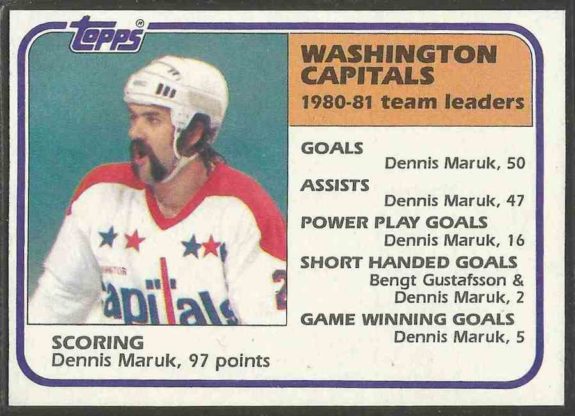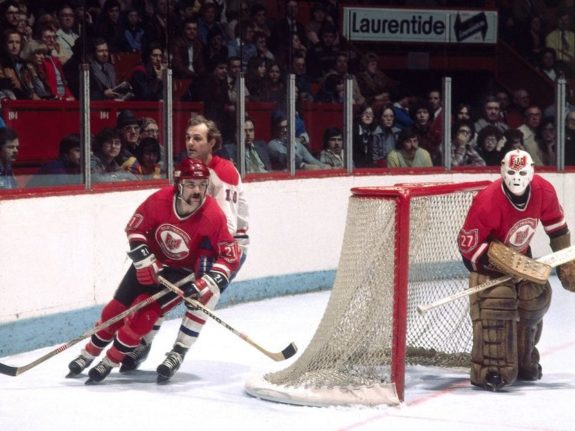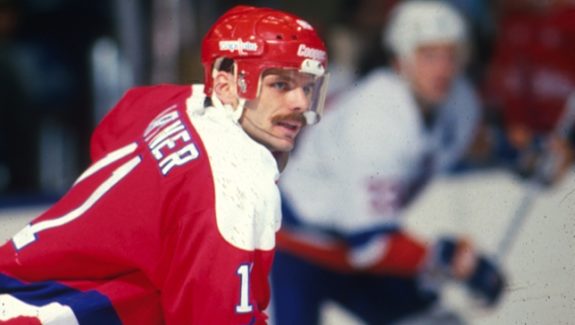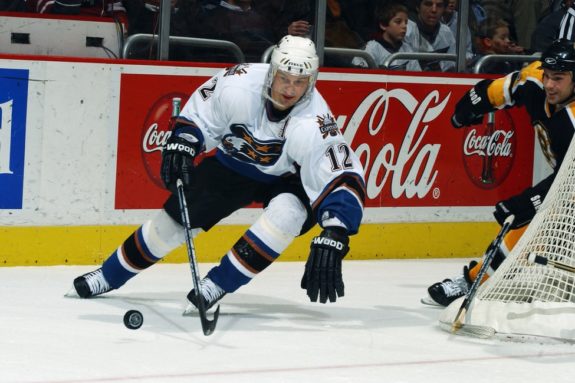In 44 years of hockey, through the team’s darkest seasons and golden eras, plenty of scoring sensations have suited up for the Washington Capitals. Surprisingly, for a team that did not win their first Stanley Cup until 2018, five different Capitals have breached the 50-goal barrier, more than on half of the “Original Six” teams. Only three Toronto Maple Leafs, three Chicago Blackhawks, and three New York Rangers have ever managed the same feat over a combined 287 seasons.
Dennis Maruk – The Capitals’ First Superstar
Of all 50-goal scorers in NHL history, few are as forgotten as Dennis Maruk, who guided the Capitals to their first-ever playoff berth in the 1982-83 season.

Maruk spent the first part of his career with the California Golden Seals, instantly standing out as a goal-scoring threat on the perennial bottom-feeding club. In his rookie season of 1975-76, he scored 30 goals, good enough for second on the team, and wound up third in Calder Trophy voting. He followed his team through their move to Cleveland as they became the Barons, until they ultimately folded and merged with the similarly cash-strapped Minnesota North Stars in 1978.
Related: Tampa Bay Lightning’s 50-Goal Scorers
However, only two games into the 1978-79 season, the Stars traded him to Washington, and the Capitals had the missing piece they were looking for.
Teamed up with Bob Carpenter and captain Rod Langway, Maruk cemented a line that boosted the Capitals into legitimate playoff contention for the first time in their history. It took a few years to pan out, and a torn MCL to Maruk which wiped out his 1979-80 season did not help matters.

Maruk returned with a vengeance the following season with a then-team record 50 goals, becoming the first Capital to crack the half-century mark. The Capitals needed every goal they could get, as they fought and scratched late in the season for a playoff berth. Goal number 50 came in the season finale, a 7-2 victory over the Detroit Red Wings at the Capitol Centre. Unfortunately, it wasn’t enough, as the Toronto Maple Leafs beat the Quebec Nordiques later that day to take the final playoff spot.
The next year, Maruk defied all expectations, smashing his previous mark with a 60-goal season that also included 76 assists. His 136 points remain a franchise record. In any other season, these numbers may have led the league. However, 1981-82 happened to be the season where Wayne Gretzky scored 50 goals in 38 games for the Edmonton Oilers and set single-season records unlikely to ever be broken, relegating Maruk’s statistics to the back of the newspapers. It didn’t help matters that the Capitals regressed that season, falling to 26-41-13. It took another year for the team to finally reach the postseason.
Bob Carpenter – The Can’t Miss Kid
Even before he set foot in the NHL, the world knew Bobby Carpenter had talent. The first player ever drafted straight out of high school, Bobby Carpenter rode onto the Washington Capitals’ roster on a wave of optimism and hype. On Oct. 7, 1981, he more than delivered on his promise when he assisted on a Ryan Walter goal just 12 seconds into his NHL debut against the Buffalo Sabres – still the fastest a player has recorded an assist in their first NHL game.
In time, he blossomed into an All-Star, and along with Maruk and Langway, led the Capitals to their first playoff appearance in the 1982-83 season. But it was 1984-85 when Carpenter had his best individual season, scoring 53 goals and 45 assists to become the first American-born player to crack the 50-goal mark. His exploits earned him NHL All-Star honors, as well as a place on the United States national teams at the Canada Cup in both 1984 and 1987.
Unfortunately, Carpenter’s career peaked with that season. His clashes with head coach Bryan Murray were too much to handle, and the Capitals dealt him to the New York Rangers (from: ‘Rangers Get Carpenter from Capitals’, New York Times – 1/2/1987). He bounced from team to team for the rest of his career, even briefly returning to Washington in 1992-93 and winning a Stanley Cup with the New Jersey Devils in 1995, but he was never quite the same player as he was during his first tenure with the Capitals.
Mike Gartner – Mr. Consistency
Carpenter, believe it or not, was not the only 50-goal scorer for the Capitals that season. Together with Mike Gartner, who entered the league in the 1979-80 season, they formed a duo known as the “Goal Dust Twins”.

The fact that Gartner scored an even 50 goals in the 1984-85 season may actually be the least remarkable factoid about his nine-and-a-half seasons in Washington. In fact, his 50 goals weren’t even good enough to lead the team that year, as Carpenter scored 53.
What jumps out more about Gartner is his consistency – not once during his time as a Capital did he score fewer than 35 goals in a season, all for a team that never made it beyond the first round of the playoffs. This sustained scoring pace allowed him to reach the 700-goal club despite only once cracking 50 goals in a season – though he did score 49 in 1990-91 as a member of the New York Rangers.
Peter Bondra – The Screaming Eagle
Even with the Capitals’ recent run of playoff success, their dream run to the Stanley Cup Final in 1998 still holds a place deep in the heart of all die-hard Caps fans who lived through it. Throughout that era of Capitals hockey, the bulk of the offense came from Peter Bondra, one of the first Czechoslovakian imports into the NHL after the thawing of the Cold War.

As the Capitals became a genuine Stanley Cup contender in the early ’90s, Bondra gradually grew into the Capitals’ main goal-scoring threat, leading the league with 34 goals in the lockout-shortened 1994-95 season. He outdid himself the following year, totaling 52 goals despite missing the first month of the season due to a contractual dispute that saw him play for the Detroit Vipers of the International Hockey League during his absence.
Two years later, Bondra pushed the bar higher, tallying a league-high 52 goals. Together with veterans such as Joe Juneau, Dale Hunter, and the reliable goaltender Olaf Kolzig, the Capitals advanced to their first Stanley Cup Final, where they were swept by the powerful Detroit Red Wings.
Alexander Ovechkin – On Pace to Catch Gretzky?
There is not much more about Alexander Ovechkin’s impact on the Capitals and the NHL that hasn’t already been said. His achievements are numerous, but three stand out: eight 50-goal seasons, eight Maurice “Rocket” Richard Trophies for leading the league in goals, and more goals than any active player in the NHL, good enough for 13th all-time.

While Ovechkin’s accomplishments have come during an era when the league has actively encouraged more open offense through rule changes and tighter officiating, few players in today’s game can keep pace with Ovi and his raw scoring ability, which has only sharpened with time. With 658 career goals in his 14-year career, another 50-goal haul for Ovechkin this season would launch him past nine more players – including the aforementioned Gartner – into fourth on the all-time list, just behind former Capital Jaromir Jagr.
At the top of the list, of course, is Wayne Gretzky and his 894 career goals, scored over a total of 21 seasons. Assuming that Ovechkin lasts as long as Gretzky, he will need seven seasons to score 236 goals, an average of 34 per season. Considering that his goal totals for the previous five seasons have been 53, 50, 33, 49, and 51, Ovechkin stands as good a chance of catching the Great One as any player ever has or likely ever will in the near future.